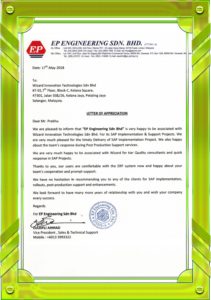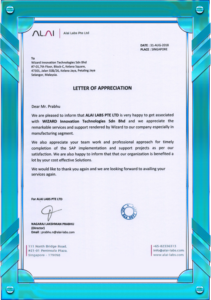- Home
- About
- Who we are
Who we are
Wizard Innovation Technologies SDN.BHD. is established in Malaysia in the year 2006 which is a leading provider of comprehensive IT solutions dedicated to delivering tailored services that align with your business goals.
Read More
- Our Vision & Mission
Our Vision & Mission
Wizard Vision and Mission both are inspiring our employees to accomplish goal. To grow current position and get a larger market as well as to provide the simple IT solutions to client. We understand the client’s requirement, analyse it and provide the best IT solutions. We satisfy our clients by our services and implement it with more effictive software solution strategies.
Read More
- Why choose us
Why choose us
At Software industry, we stand out because of our dedication to quality, customer satisfaction, and results. With over 18 years of experience in IT industry, we specialize in Software development and Support. Our team works closely with each client to understand their unique needs, ensuring tailored solutions that lead to real, measurable success.
Read More
- Testimonials
- Who we are
- Our Services
- Wizard Services
- SAP
-
-
SAP ERP Products
SAP ERP (Enterprise Resource Planning) products are designed to integrate and streamline business processes across various departments such as finance, sales, human resources, logistics, and procurement.
Read More
-
SAP Services
SAP services encompass a wide range of offerings that help organizations implement, manage, and optimize their SAP solutions.
Read More
-
-
-
- Microsoft Services
Sharepoint
Wizard provides a wide range of SharePoint consulting services to our clients, We provide services ranging from basic configuration and deployment to developing enterprise SharePoint portals that integrate with multiple disparate applications.
Read MoreMicrosoft Power BI
Microsoft Power BI is a collection of software services, apps, and connectors that work together to turn your unrelated sources of data into coherent, visually immersive, and interactive insights.
Read More
- Mobile Application Development
Mobile Application Development
In today’s digital environment, developing a mobile app might be a useful tactic for growing your company. A well-thought-out mobile app can enhance client interaction, offer a practical means for customers to engage with your goods or services, and even expedite internal procedures.
Read More
- Software Development
Software Development
Of sure, I’d be pleased to share my knowledge of software development! The process of developing, designing, testing, and maintaining computer programs and applications is known as software development. It includes a broad variety of actions and approaches with the goal of creating software that is of high quality and satisfies the needs of customers or users.
Read More
- Application Management Services
Application Management Services
Overall, Application Management Services enable organizations to effectively manage their IT applications while leveraging external expertise, resources, and scalability. It allows businesses to stay competitive, innovate, and adapt to changing technological landscapes without the burden of maintaining and supporting applications internally.
Read More
- IT Expertise Outsourcing
IT Expertise Outsourcing
Searching for the right candidate is never easy because the goal is not just to find a skilled candidate, but to find one that fits your organization’s culture. Staffing, in general, is hard enough already, but finding unique, qualified talent in today’s market is incredibly challenging.
Read More
- Products
- Mye-Invoice
- Career
- Contact














